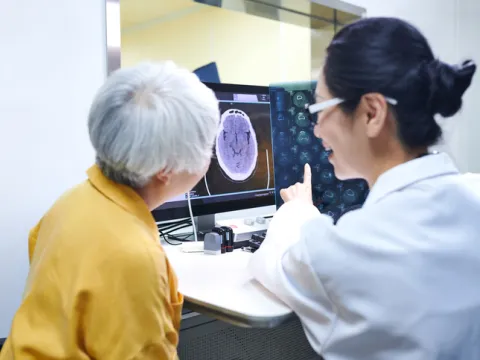- AdventHealth

Fabry disease is a rare, inherited, multi-systemic, biochemical neurological disorder that occurs when the enzyme alpha-galactosidase-A cannot efficiently break down lipids into smaller components that provide energy to the body. The mutated gene causes lipids to build up to harmful levels in the body’s autonomic nervous system, eyes, kidneys and cardiovascular system, leading to a variety of symptoms that typically arise in childhood or adolescence.
Under the leadership of Medical Director of Genomics and Personalized Health Majed Dasouki, MD, AdventHealth for Children is recruiting patients for a new Phase III clinical trial to evaluate the effect of venglustat tablets on neuropathic and abdominal pain in male and female Fabry disease patients who are 16 years of age or older. The PERIDOT trial is a 12-month, parallel treatment, Phase III, double-blind, randomized, placebo-controlled study to evaluate the effect of venglustat on neuropathic and abdominal pain symptoms of Fabry disease in participants ≥16 years of age with Fabry disease who are treatment-naïve or untreated for at least 6 months.
Study visits will take place approximately every 3 months, and the double-blind period will be followed by an open-label extension during which participants who have completed the double-blind period will be treated with venglustat for up to an additional 12 months. The PERIDOT trial will evaluate two primary outcome measures:
- Percentage change from baseline at 6 months and 12 months in the most bothersome symptom of 3 Fabry disease patient-reported outcome (FD-PRO) items -- neuropathic pain in upper extremities, neuropathic pain in lower extremities and abdominal pain.
Secondary outcome measures include the following:
- Percent change in plasma globotriaosylsphingosine (lyso-GL-3)
- Frequency of rescue pain medication use
- Number of days with use of rescue pain medications during the 6-month and 12-month treatment periods, divided by duration of the treatment period and multiplied by 100.
- Change in the percentage of days with at least 1 stool reflecting diarrhea (Bristol Stool Form Scale [BSFS] Type 6 or 7)
- Percent change in tiredness component of FD-PRO
- Proportion of responders in neuropathic or abdominal pain, as assessed by FD-PRO
- Number of participants with adverse event (AE) and serious adverse event (SAE)
- Change in the lens clarity (new or worsening lens opacities) by ophthalmological examination (by slit lamp exam at Visit 2 and Visit 6)
- Change in Beck Depression Inventory-II (BDI-II) score
- Plasma venglustat concentrations at prespecified visits over the study duration
- Maximum venglustat plasma concentration (Cmax)
- Time to maximum venglustat plasma concentration (tmax)
- Area under the venglustat plasma concentration versus time curve from time 0 to 24 hours (AUC0-24)
“All of the currently approved treatments for Fabry disease are intravenous therapies,” explains Dr. Dasouki. “While they can be effective in improving symptoms, intravenous therapies always carry a treatment burden for patients and families. The PERIDOT study is evaluating an oral tablet, which if proven safe and effective, could be an easier and more acceptable treatment option for patients suffering from the debilitating pain Fabry disease can cause.”
Full inclusion and exclusion criteria for the PERIDOT clinical trial can be viewed here.
Recent News
Findings of the phase III, multicenter, randomized NSABP B-51-RTOG 1304 clinical trial were recently published in the New England Journal of Medicine with AdventHealth Cancer Institute’s Dr. Mamounas...
Under the leadership of Dr. Valeria Baldivieso and Dr. Chandan Reddy, the AdventHealth Research Institute is the first and only site in Orlando offering the Exablate Blood-Brain Barrier (BBB)...
Approximately 1 billion people throughout the world suffer from tinnitus (ringing in the ears), and it is the number one disability of those who serve in the U.S. military. The condition can disrupt...
Metabolic dysfunction associated steatotic liver disease (MASLD), formerly referred to as nonalcoholic fatty liver disease (NAFLD), affects about 70% of people with type 2 diabetes, placing them at...
AdventHealth East Orlando recently became the first hospital in Florida to earn Advanced Foot & Ankle Surgery Certification from DNV, a worldwide, independent certification body.
In a new article published in the medical journal Age and Ageing, AdventHealth Research Institute’s Dr. Audrey Collins shares the results of a recent study evaluating the impact of exercise on...
Accurately determining food intake remains a challenge in nutrition research. A new study published in Nature Metabolism and co-authored by Dr. Corbin introduces a metagenomics-powered approach to...
Discover what’s being accomplished in Central Florida to bridge the health gap with Orange County Mayor Jerry Demings and AdventHealth’s Dr. Alric Simmonds.
Breakthrough device offers new hope for stroke survivors struggling with rehabilitation following ischemic stroke
Jennifer Seminerio, MD, recently became one of the first in Florida to use intestinal ultrasound (IUS) to help assess and manage treatment of patients with inflammatory bowel disease (IBD). A non...
Physician leaders from AdventHealth’s emergency department, infectious disease, inpatient, pediatrics and pharmacy teams all collaborated to develop a respiratory virus testing algorithm to assist...
Thoracic surgeon Colleen Gaughan, MD, and her team at AdventHealth Celebration, recently became one of the first in the country to incorporate targeted imaging agent Cytalux (pafolacianine) as part of...












